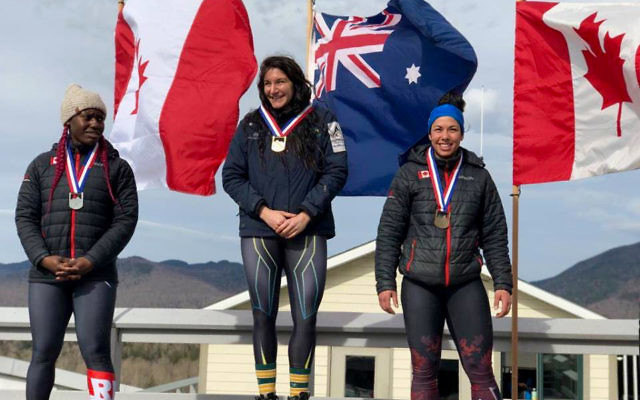Debut monobob win is icing on Werner’s cake
ASHLEIGH Werner has had a golden start to competing in bobsleigh's newest discipline – women's monobob (solo bobsleigh) – earning her first international race win last month at Lake Placid, USA, the 20-corner Olympic course where she first learnt to drive a sled in 2017.

ASHLEIGH Werner has had a golden start to competing in bobsleigh’s newest discipline – women’s monobob (solo bobsleigh) – earning her first international race win last month at Lake Placid, USA, the 20-corner Olympic course where she first learnt to drive a sled in 2017.
It could not have come at a more exciting time for the 26-year-old Sydneysider, who piloted Australia’s two-woman bobsleigh team in February to finish second overall in the eight-round North America Cup, and 22nd in the world rankings.
Previously used as a training tool, monobob was included in the just-completed 2018-19 International Bobsleigh and Skeleton Federation season as a competitive sport for the first time, and the International Olympic Committee recently announced women’s monobob will make its Winter Olympics debut in Beijing in 2022.
“It feels surreal, because I never went over there with expectations,” Werner told The AJN upon returning to Sydney for the offseason.
“I didn’t believe it [that I’d won] when the last sleds came down … and Lake Placid has a really soft spot in my heart, so it was the icing on the cake to come away with a gold medal on that track.”
The Lake Placid women’s monobob tournament in mid-April featured two races with medals up for grabs.
Werner reached a top speed of 106km/h in race one, finishing the fastest of 11 competitors on the 1.5km course, posting run times of 1:00.95 and 1:02.16.
She won gold by edging Canada’s Cynthia Serwaah by 0.13 seconds, while Canadian Catherine Medeiros won bronze.
Werner missed out on a second medal by just 1.78 seconds in race two, coming fourth. Serwaah was fastest that time, with Jamaican Carrie Russell winning silver, and American Shelby Williamson claiming bronze.
The key to winning gold, Werner said, was staying calm and taking advantage of racing to the conditions.
“Race day was warm, so the softer ice slowed everything down, and you could see how rapidly the track deteriorated by the difference in the two run times.”
“I adjusted my race plan accordingly, and [it helped] just knowing how to handle different situations when they arise, and not panicking.
“I knew my start was never going to be fast, but I really backed my driving abilities, and didn’t overthink things.”
Although she learnt to drive a sled in a monobob, Werner said monobob racing requires a different set of skills.
“The monobob weighs the same as a two-person bobsleigh [about 175kg], but you have to push it all by yourself, and do it from behind, instead of from the side like I’m used to as a pilot.
“But once you’re inside, the monobob is about 70kg lighter because there’s only you in it, so it doesn’t quite reach the same top speeds or get as high on the corners.
“The positive is you can [recover from] mistakes a lot easier.”
Werner, who works full-time in the off-season as a business analyst, said her main focus now is holistic fitness training to keep her mind and body in peak condition, while also keeping her Australian teammates connected and motivated.
“I strongly believe a united team is the key to succeeding in this sport, and next season will be our biggest yet.
“I know we have the potential to achieve great things.”
SHANE DESIATNIK

comments